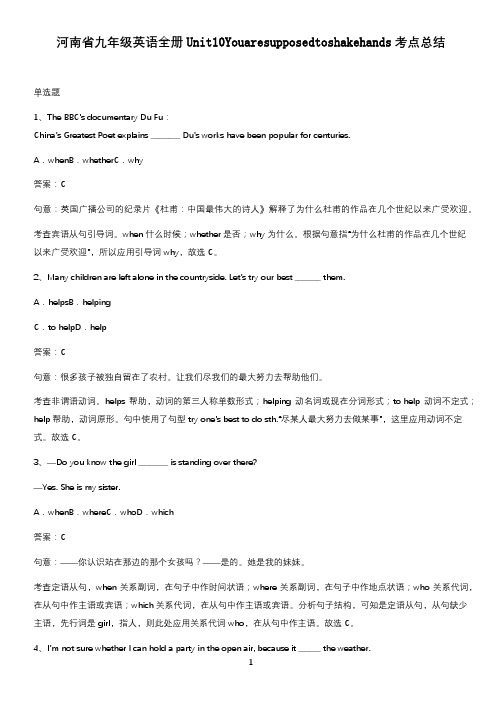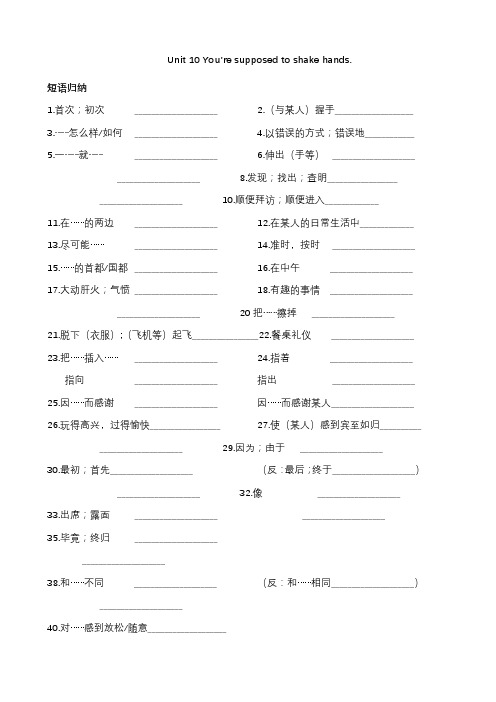九年级英语全册Unit10You’resupposedtoshakehandsSectionA1a_2d作业人教新目标版
- 格式:ppt
- 大小:13.34 MB
- 文档页数:5

九年级英语上册Unit10 You’re supposed to shake hands一、课文知识要点:1、You’re supposed to shake hands.你应该握手.①be supposed to do sth.是“应该……",与should用法相似。
否定形式是be not supposed to do sth,意为“不应该……"。
You are supposed to study harder。
你应该更努力学习.You are not supposed to eat so much。
你不应该吃这么多。
Drivers are supposed to wear the seat belt when driving。
司机开车的时候应当系好安全带。
②shake “摇动、抖动”shake → shook → shakenshake hands 握手;shake hands with sb。
/ shake one’s hands 与某人握手At last,he shook his head and refused.最后,他摇摇头拒绝了.2、In the United States,they’re expected to shake hands。
在美国他们要握手.expect “期望;指望;认为;预料”;expect to do sth.期望/期待做某事expect sb to sth. 期待某人做某事be expected to sth 被期待/要求做某事She expects to go abroad。
她期待着出国。
I expected my son to pass the exam.期望我的儿子通过考试。
You can’t expect me to finish the work in just two days.你不能期望我仅在两天之内完成这项工作。
She is expected to be a good doctor。

You’re supposed to shake hands教学目标知识与技能:1.能掌握以下重难点句子:You’re supposed to …You’re not supposed to…It’s impolite to …You shouldn’t …2.提高学生的听力水平,培养学生的阅读能力,理解关键词和短语的能力。
过程与方法:直观看图,反复听力,阅读获取信息。
情感态度价值观:通过对一些国家的风俗习惯和饮食文化。
餐桌礼仪的了解,进一步提高学生对文明生活的认识。
教学方法直观展示法,情境创设法学习方法模仿,讨论与交流。
教学准备图片,录音机,多媒体。
教学过程设计意图Step 1 GreetingsGreet the students as usual.Step 2 Warming up让学生展示“哥伦比亚和瑞士的礼仪”的短文。
对于好的给予鼓励。
Step 3 Lead in利用大屏幕展示一些国家吃饭的情景,或一些在餐馆吃饭的图片,边放边介绍,让学生对中西方就餐文化有所了解,并引入新课。
Step 4 Presentation1. Work on 1a. How much do you know about table manners around the world? Take the following quiz. Circle T for true or F for false after each sentence.Mind your manners!Make students be interested in and get involved in the topic of this class.1. In India, you’re supposed to eat with your hands. T F2. In China, you’re not supposed to stick your chopsticks into the food. T F3. In Korea, the youngest person is expected to start eating first. T F4. In France, you’re supposed to put your bread on the table. T F5. In China, it’s impolite to use your chopsticks to hit an empty bowl. T F1)先让学生自己做,老师指导,让他们理解每个句子的意思。

人教版九年级全一册英语Unit10重点语法知识点总结Unit 10 You're supposed to shake hands.Section A(1a~2d)_必记单词_1. custom n.风俗;习俗【例句】The Japanese customs are different from the Chinese ones.日本的风俗习惯与中国的不同。
2. bow v.& n.鞠躬【例句】The speaker bowed to the listeners. 演讲者向听众鞠躬。
3. kiss v. & n.亲吻;接吻【例句】He gave her a kiss of affection.他给她一个表示爱的吻。
4. greet v.和……打招呼;迎接【例句】We greeted her by saying“Good morning”.我们向她打招呼,说“早上好”。
【联想】greeting n.问候,招呼【搭配】greet with 以……迎接……greet sb. at the airport 在机场迎接某人常考短语ⅡⅡ_1. for the first time 首次;初次2. make friends 交朋友【例句】I find it difficult to make friends with Jim. 我发现和吉姆交朋友很难。
3. as soon as 一……就……4. shake hands (with sb.)(与某人)握手【例句】We usually shake hands with each other.我们通常相互握手。
5. the wrong way 以错误的方式;错误地【例句】You understood him in the wrong way. 你错误地理解他了。
6. hold out 伸出(手等)7. greet each other 互相问候8. to one’s surprise 令某人惊讶的是经典句型ⅢⅡ1. That's how people in Japan are expected to greet each other.那就是在日本人们互相问候的方式。

![九年级英语Unit10You’resupposedtoshakehands.课文重难点知识点详细讲解[1]解读](https://img.taocdn.com/s1/m/6ec6289ed4d8d15abe234ee6.png)
Unit10 You’re supposed to shake hands.Section A1.In your country, what are you supposed to do when you meet someone for the first time?在你们国家,当你第一次见到某人的时候你应该做什么?【解析】be supposed to do sth 被期望做某事,应该做......1)当主语是人时,表示劝告、建议、责任等,=should =“to be expected to do sth,You are supposed to___________( arrive) on time2)当主语是物时,表示“本应;本该”The train was supposed to arrive half an hour ago.【拓展】:be supposed to 与should(1)be supposed是suppose一词的___________ 语态结构。
后接动词不定式,相当于___________ .后接不定式.即:_______________ . 使用较随便,建议性强否定式为be not supposed to do sth.()To keep safe, drivers aren’t supposed to drink before driving.A. aren’t willing toB. shouldn’tC. aren’t sure toD. don’t have to(2)should后接动词______ ,属于_______ 语态形式,使用起来较严肃和正式;You are not supposed to shake hands. = You shouldn’t shake hands.你不应与之握手。
【2012贵州贵阳】“Henry, you ______ tell the teacher if you want to go out of the classroom.”“Sorry, sir.”A. are supposed toB. are surprised toC. are afraid to【2013山东菏泽】8. You are _____to type quickly when talking to each other on QQ so the other person doesn't get bored A. suggested B. supportedC. taughtD. Supposed【2013黑龙江绥化】29. You are supposed to ________ smoking, ________ you will get ill.A. go on; soB. give up; or C stop; so【2014黔西南州】27. The students ought to wear school uniforms when they’re at school.A. are supposed toB. are allowed toC. would like toD. love to 【2014云南昆明】29. We are supposed to ___________a solution to stop people from looking down at their mobile phones while driving cars.A. come up withB. come formC. come outD. come true 【解析2】for the first time 首先,第一次【辨析】at first/first of all(1) at first = at the beginning 最初,开始【强调在时间顺序或做某事过程等开始之初】(2) first of all 首先,第一【表明陈述事情的重要性】( ) When you want to work for our country in the future, ____, we should have strong body and rich knowledge.A. at firstB. first of allC. for the first timeD. after all【山东德州】We can do a lot to stay healthy. ____ , we should eat a balanced(平衡的) diet.A. At a timeB. In factC. First of allD. All together【有关time的短语】A. firstB. oneC. onceD. firstly【2014贵州六盘水】24. Children always have a good time at the Wetland Park(湿地公园) of Liu Panshui.A. enjoy themselvesB. help each otherC. look beautifulD. have a big dinner()② People in China ________when they meet for the first time.A. bowB. kissC. shake handsD. laugh【新疆】You’re supposed to shake ______ (hand) when you meet your friends.( ) ②—Do you think our football team will win the match? —Yes, we have better players. so I ___them to win.A. hopeB. askC. helpD. expect【2013山东青岛】14. — You look sad. What has happened? —Everyone ______ us to win the match, but we lost.A. expectsB. expectedC. hopesD. Hoped【2013 湖北黄冈】30. Speak slowly, Mr. Wang. I can’t follow you.D. expect希望全班同学参加讨论。

Unit10You'resupposedtoshakehands原文与翻译初中生学习英语要注意多听,将上课本录音下载下来,课前课后要反复练习听力,不能只停留在课上听的那十几分钟上。
下面是小偏整理的Unit10You'resupposedtoshakehands原文与翻译,感谢您的每一次阅读。
Unit10You'resupposedtoshakehands原文与翻译SectionA1bListenandcheckyouranswersin1a.Yoshi:Whatarepeoplesupposedtodowhentheymeetinyourco untry,Rodrigo?Rodrigo:Doyoumeanwhenpeoplemeetforthefirsttime?Yoshi:Yeah.Rodrigo:InMexico,weshakehands.Yoshi:WhataboutinBrazil,Celia?Celia:Well,inBrazil,peoplesometimeskiss.HowaboutinJapan,Y oshi?Whatarepeopleexpectedtodowhentheymeetforthefirsttime?Yoshi:Webow.Kim:AndinKoreawealsobow.Mike:Well,IguessinmostWesterncountriesweshakehands.SectionA2astnightshehaddinneratanAmer icanfriend’shouse.Listenandcheck(√)themistakesMariamade.Daisy:Hi,Maria.HowwasPaul’sparty?Maria:Oh,Daisy,itwasterrible.Daisy:Itwas?Maria:Uh-huh.Daisy:Whathappened?Maria:Well,Iwassupposedtoarriveat7:00,butIarrivedat8:00.Daisy:Oh,soyouwerelate.Maria:Yeah,butinmycountry,it’sdifferent.Whenyou’reinvit edfor7:00,you’reexpectedtocomelater!It’sconsideredstranget oturnupontime.Daisy:Isee.Maria:ThenwhenImetPaul’smom,Ikissedher.Daisy:Oh…youweresupposedtoshakehandsinstead.Maria:That’sright.AndIworeafanc ydress.Daisy:What’swrongwiththat?Maria:Well,itturnedoutthatitwasanoutdoorparty,Daisy.Every oneelsewasinaT-shirtandjeans.Daisy:Iguessnexttimeyoushouldaskwhatyou’resupposedto wear.SectionA2bListenagain.Fillintheblanks.Daisy:Hi,Maria.HowwasPaul’sparty?Maria:Oh,Daisy,itwasterrible.Daisy:Itwas?Maria:Uh-huh.Daisy:Whathappened?Maria:Well,Iwassupposedtoarriveat7:00,butIarrivedat8:00.Daisy:Oh,soyouwerelate.Maria:Yeah,butinmycountry,it’sdifferent.Whenyou’reinvit edfor7:00,you’reexpectedtocomelater!It’sconsi deredstranget oturnupontime.Daisy:Isee.Maria:ThenwhenImetPaul’smom,Ikissedher.Daisy:Oh…youweresupposedtoshakehandsinstead.Maria:That’sright.AndIworeafancydress.Daisy:What’swrongwiththat?Maria:Well,itturnedoutthatitwasanoutdoorparty,Daisy.EveryoneelsewasinaT-shirtandjeans.Daisy:Iguessnexttimeyoushouldaskwhatyou’resupposedto wear.SectionA2dRoleplaytheconversation.Howwasthewelcomepartyforforeignstudentslastnight?Great!Imadesomenewfriends.Butafunnythinghappened.What?ImetaJapaneseboycalledSato,andassoonasIheldoutmyhand, hebowed.That'showpeopleinJapanareexpectedtogreeteachother.It'sim politeifyoudon'tbow.Ididn'tknowthat.SoIjuststoodtherewithmyhandout.Finally,Ire turnedthebow.IrememberwhenlfirstmetMarielastyear,Ididthesamething.Ihe ldoutmyhandandtomysurprise,shekissedmeonbothsidesofmyfac e!Iwouldn'tmindthat!terlfoundoutFrenchpeoplearesupposedtokissw hentheyseeeachother.SectionA3aReadthefollowingopinionsofaColombianandaSwissstudent.I nwhichcountryisitOKtobe15minuteslatefordinner?TeresaLopezCall.ColomblaWhereI’mfrom,we’reprettyrelaxedabouttime.Wedon’tlik etorusharound,sowedon’tmindifpeoplearealittlelatesometimes.Ifyoutellafriendyou’regoingtotheirhousefordinner,it’sOKif youarriveabitlate.Weliketoenjoyourtimeslowly.Wevaluethetimew espendwithourfamilyandfriendsinoureverydaylives.Weoftenjustdropbyourfriendshomesifwehavetime.Wedon’tusuallyhavetomakeplanstomeetourfriends.Whenweseeeachoth er,it’spoliteforboystoshakehandsandforgirlstokisseachotheront hesideoftheface.Weoftenjustwalkaroundthetowncenter,seeingasmanyofourfr iendsaswecan!Marcleblanclausanne.SwitzerlandInSwitzerland,it’sveryimportanttobeontime.We’rethecapi talofclocksandwatches,afterall!Ifsomeoneinvitesyoutomeethimo rheratnoon,thenyou’reexpectedtobethereatnoon.Ifyou’reeven15minuteslate,y ourfriendmaygetmad.SoImake anefforttobeontimewhenImeetmyfriends.Ialwaysleavethehousee arlytoavoidheavytrafficbecauseIthinkit’simpolitetokeepothersw aiting.Also,wenevervisitafriend’shousewithoutcallingfirst.Wealmo stalwaysmakeplanstoseefriends.Weusuallyplantodosomethingin teresting,orgosomewheretogether.SectionB1bSteveisgoingtoChinatostudy.HisfriendYangMingistellinghim aboutthetablemannersinChina.Listenandnumberthepicturesinth eorderyouhearthem.YangMing:YoumustbeexcitedaboutleavingforChinatomorro w,Steve!Steve:Yeah,butI’malittlenervous,too.YangMing:Why?Steve:Well,foronething,Idon’tknowhowtousechopsticksver ywell…andIdon’tknowhowtobehaveatthedinnertable.YangMing:Oh,Isee.Well,oneimportantthingisthatyou’renots upposedtostarteatingfirstifthereareolderpeopleatthetable.Steve:That’sinteresting.IntheUnitedStates,itdoesn’tmatter.YangMing:Yeah,Iknow.It’salsoimpolitetostickyourchopsticksintoyourfood.Youshouldn’tpointatanyonewithyourchopsticks, either.Steve:Oh,OK.YangMing:Oh,andthere’sonemorethingyouneedtoknow.Yo u’renotsupposedtotalkwhenyou’reeatingdinner.Onlyparentsa reexpectedtotalkatthedinnertable.Childrenarenotallowedtospea k.Steve:Wow!That’s…that’sunusual!YangMing:Haha,I’mjustkidding!SectionB1cListenagain.Matchthesesentenceparts.YangMing:YoumustbeexcitedaboutleavingforChinatomorro w,Steve!Steve:Yeah,butI’malittlenervous,too.YangMing:Why?Steve:Well,foronething,Idon’tknowhowtousechopsticksver ywell…andIdon’tknowhowtobehaveatthedinnertable.YangMing:Oh,Isee.Well,oneimportantthingisthatyou’renots upposedtostarteatingfirstifthereareolderpeopleatthetable.Steve:That’sinteresting.IntheUnitedStates,itdoesn’tmatter.YangMing:Yeah,Iknow.It’salsoimpolitetostickyourchopstick sintoyourfood.Youshouldn’tpo intatanyonewithyourchopsticks, either.Steve:Oh,OK.YangMing:Oh,andthere’sonemorethingyouneedtoknow.Yo u’renotsupposedtotalkwhenyou’reeatingdinner.Onlyparentsa reexpectedtotalkatthedinnertable.Childrenarenotallowedtospea k.Steve:Wow!That’s…that’sunusual!Yang Ming:Haha,I’mjustkidding!Readtheletterandanswerthequestions.DearLaura,Thanksforyourmessage.Yes,I’mhavingagreattimeonmystudentexchangeprograminFrance.IwasabitnervousbeforeIar rivedhere,buttherewasnoreasontobe.Myhostfamilyisreallynice.Th eygooutoftheirwaytomakemefeelathome.Thegrandmotherknow sthatImissChinesefoodalot.SosheactuallylearnedhowtomakeChi nesefood!Shealsohasateenagegranddaughteraboutmyagewhois reallykind.ShealwaystalkstomeinFrenchtohelpmepractice.Youwo uldn’tbelievehowquicklymyFrenchhasimprovedbecauseofthat.I’mverycomfortablespeakingFrenchnow.AlthoughIstillmak elotsofmistakes,itdoesn’tworrymeasitusedto.Mybiggestchallengeislearninghowtobehaveatthedinnertabl e.Asyoucanimagine,thingsareverydifferentfromthewaytheyareat home.Forexample,you’renotsupposedtoputyourbreadonyourpl ate.You’resupposedtoputitonthetable!Ithoughtthatwasprettyst rangeatfirst,butnowI’musedtoit.Anotherexampl eisthatyou’renotsupposedtoeatanythingwit hyourhandsexceptbread,notevenfruit.Youhavetocutitupandeatit withafolk.Anotherthingisthatitisimpolitetosayyou’refull.Ifyoudo n’twantanymorefood,youshouldjustsay,“Thatwasdelicious.”Al so,you’renotsupposedtoputyourelbowson thetable.Ihavetosayt hatIfinditdifficulttoremembereverything,butI’mgraduallygettingusedtoit.Idon’tfindFrenchcustoms sostrangeanymore,I’llwriteagainsoonandtellyoumoreaboutmylifeinFrance.Hopeyou’rehavingagoodschoolyear.Yours,LinYue翻译:凯蒂:昨晚为留学生举办的欢迎派对怎么样?约翰:真棒!我交了一些新朋友,不过发生了一件很有趣的事情。

Unit10 You’re supposed to shake hands.Section A Period 1(1a-2d)研学案【课前热身】写出下列单词和短语,并高声朗读。
握手风俗_______ 鞠躬___ 亲吻问候第一次_______________应该做某事__________________ 用错误的方式与某人问好____________________犯错误________________ 欢迎会_____________ 一…….就…….._____________ 做同样的事情_____________在我的双颊上___________一个叫佐藤的日本男孩________ 【学习目标】1.掌握be supposed to, be expected to do的用法。
2.了解不同国家的风情。
【知识点拨】1.be supposed to用来表示根据规定或按照法律人们不得不做的事,或期待将要发生的事,与should相似,后面也是接动词原形。
否定形式在be动词后加not,常表示禁止做某事。
We’re supposed to make no noise in class. 在课堂上我们不该发出噪音。
We’re supposed to start work at 8∶00 every morning.我们应该每天早晨八点开始工作。
【课堂同步】(一) 仿写句子。
In Brazil, we are supposed to/expected to kiss when we meet someone for the first time.In the United States, when we meet someone for the first time.In Japan, when we meet someone for the first time.In koreaIn Mexico(二)2a and 2b 词句检测:1.Maria以错误的方式问候了Paul 的母亲。

河南省九年级英语全册Unit10Youaresupposedtoshakehands考点总结单选题1、The BBC's documentary Du Fu:China's Greatest Poet explains ________ Du's works have been popular for centuries. A.whenB.whetherC.why答案:C句意:英国广播公司的纪录片《杜甫:中国最伟大的诗人》解释了为什么杜甫的作品在几个世纪以来广受欢迎。
考查宾语从句引导词。
when什么时候;whether是否;why为什么。
根据句意指“为什么杜甫的作品在几个世纪以来广受欢迎”,所以应用引导词why,故选C。
2、Many children are left alone in the countryside. Let’s try our best _______ them.A.helpsB.helpingC.to helpD.help答案:C句意:很多孩子被独自留在了农村。
让我们尽我们的最大努力去帮助他们。
考查非谓语动词。
helps帮助,动词的第三人称单数形式;helping动名词或现在分词形式;to help动词不定式;help帮助,动词原形。
句中使用了句型try one’s best to do sth.“尽某人最大努力去做某事”,这里应用动词不定式。
故选C。
3、—Do you know the girl ________ is standing over there?—Yes. She is my sister.A.whenB.whereC.whoD.which答案:C句意:——你认识站在那边的那个女孩吗?——是的。
她是我的妹妹。
考查定语从句,when关系副词,在句子中作时间状语;where关系副词,在句子中作地点状语;who关系代词,在从句中作主语或宾语;which关系代词,在从句中作主语或宾语。

Unit 10 You're supposed to shake hands.短语归纳1.首次;初次____________________2.(与某人)握手___________________3.……怎么样/如何____________________4.以错误的方式;错误地____________5.一……就……____________________6.伸出(手等)________________________________________ 8.发现;找出;查明_________________ ____________________ 10.顺便拜访;顺便进入_____________11.在……的两边____________________ 12.在某人的日常生活中_____________ 13.尽可能……____________________ 14.准时,按时____________________ 15.……的首都/国都____________________ 16.在中午____________________ 17.大动肝火;气愤____________________ 18.有趣的事情________________________________________ 20把……擦掉____________________21.脱下(衣服);(飞机等)起飞________________22.餐桌礼仪____________________ 23.把……插入……____________________ 24.指着____________________指向____________________ 指出____________________25.因……而感谢____________________ 因……而感谢某人____________________26.玩得高兴,过得愉快_________________ 27.使(某人)感到宾至如归______________________________ 29.因为;由于____________________30.最初;首先____________________ (反:最后;终于____________________)____________________ 32.像____________________ 33.出席;露面____________________ ____________________35.毕竟;终归________________________________________38.和……不同____________________ (反:和……相同____________________)____________________40.对……感到放松/随意___________________Section A风俗习惯1)custom〔名词〕风俗;习俗The customs are different from country to country.I don't like the custom of giving presents in that country.The Japanese customs are different from the Chinese ones.Nailbiting is one of her bad habits.2.bow 鞠躬bow①〔不及物动词〕鞠躬bow to/before...向……鞠躬The speaker bowed to/before the listeners.②〔及物动词〕低(头)She bowed her head.③〔名词〕鞠躬(读作/bau/);弓(读作/bəu/)The Japanese usually take a bow while greeting.He made his son a bow.3.shake hands 握手shake hands 握手其中shake(shook,shaken) 既可用作及物动词,也可用作不及物动词,意为“摇动;抖动”。